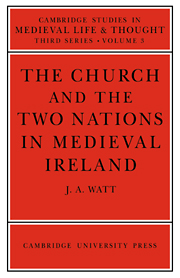Book contents
- Frontmatter
- Contents
- LIST OF MAPS
- FOREWORD
- ACKNOWLEDGMENTS
- ABBREVIATIONS
- 1 THE CHURCH IN IRELAND ON THE EVE OF THE INVASION
- 2 THE ESTABLISHMENT OF THE NEW ORDER
- 3 THE NEW ORDER CONSOLIDATED
- 4 THE CRISIS OF THE CISTERCIAN ORDER IN IRELAND
- 5 ECCLESIA HIBERNICANA
- 6 THE CLERGY AND THE COMMON LAW, 1255–91
- 7 THE CLERGY AND THE COMMON LAW, 1295–1314
- 8 THE EPISCOPATE IN THE REIGN OF EDWARD I
- 9 FOURTEENTH CENTURY DEVELOPMENTS
- 10 THE STATUTE OF KILKENNY
- APPENDIX 1 Canterbury's claim to primacy over Ireland
- APPENDIX 2 The Armagh election dispute, 1202–7
- BIBLIOGRAPHY
- INDEX
7 - THE CLERGY AND THE COMMON LAW, 1295–1314
Published online by Cambridge University Press: 28 October 2009
- Frontmatter
- Contents
- LIST OF MAPS
- FOREWORD
- ACKNOWLEDGMENTS
- ABBREVIATIONS
- 1 THE CHURCH IN IRELAND ON THE EVE OF THE INVASION
- 2 THE ESTABLISHMENT OF THE NEW ORDER
- 3 THE NEW ORDER CONSOLIDATED
- 4 THE CRISIS OF THE CISTERCIAN ORDER IN IRELAND
- 5 ECCLESIA HIBERNICANA
- 6 THE CLERGY AND THE COMMON LAW, 1255–91
- 7 THE CLERGY AND THE COMMON LAW, 1295–1314
- 8 THE EPISCOPATE IN THE REIGN OF EDWARD I
- 9 FOURTEENTH CENTURY DEVELOPMENTS
- 10 THE STATUTE OF KILKENNY
- APPENDIX 1 Canterbury's claim to primacy over Ireland
- APPENDIX 2 The Armagh election dispute, 1202–7
- BIBLIOGRAPHY
- INDEX
Summary
The common law principle of the status of the clergy has been given classic formulation by Maitland: ‘with one great and a few petty exceptions the clerk was protected by and subject to the same rules of temporal law which guarded and governed the layman’. That the royal courts in Ireland maintained the same principle is amply borne out by the records of the justiciar's court. It is clear that in the preservation of the rights of the king and of the king's peace, the judges were not prepared to concede anything to clerical privilege beyond the established English practice. On the other hand, the clergy used the king's courts freely for their own purposes—in all civil actions against other clerics and laymen, in securing protection, even against ecclesiastical oppression, in demanding the help of the secular arm in the caption of excommunicates. And they enjoyed that privilegium fori which was the ‘great exception’ allowed to clerics from the normal operation of the law of felony.
The clergy in the common law area of Ireland had their ‘benefit’ in the same way as the clergy in England. A clerk accused of any felony, having proved his clergy, would be delivered to the ecclesiastical court for trial and punishment, if need be. The procedure was the usual English one. The genuineness of the claim to be a clerk was strictly examined; the prisoner was required to show when and from whom he had received his orders.
- Type
- Chapter
- Information
- The Church and the Two Nations in Medieval Ireland , pp. 136 - 148Publisher: Cambridge University PressPrint publication year: 1970



